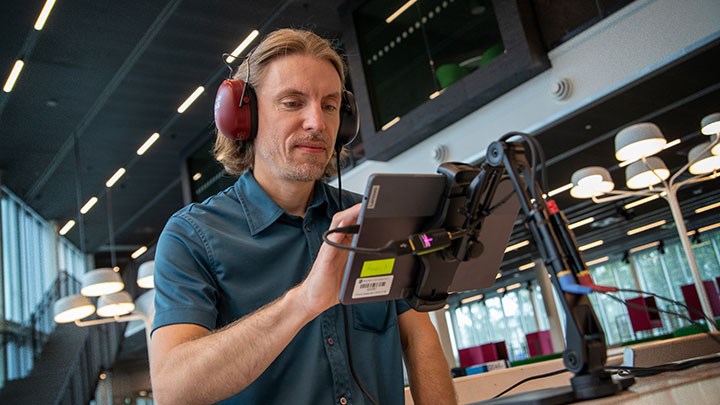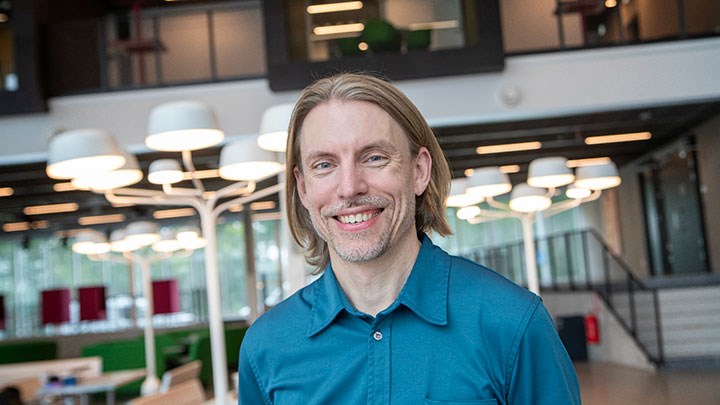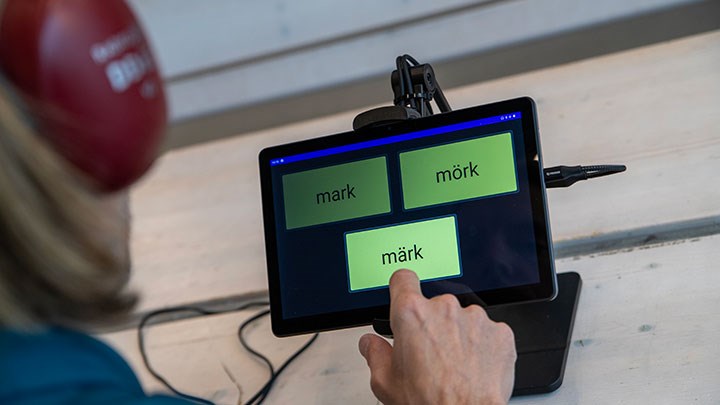Örebro researcher’s innovation can cut healthcare queues: “Unacceptable to wait a year”

Erik Witte came up with the idea while working on his doctoral thesis and has since participated in the Social Impact Lab innovation environment at Örebro University.
Erik Witte, researcher at Örebro University, has developed a new and innovative hearing test that is both quicker and more sensitive than current tests. This new technology could enable screening of suspected hearing loss and assist existing patients in obtaining better-fitting hearing aids. “It could give Swedish hearing care a significant boost,” says Erik Witte.
Applications now open for Social Impact Lab 2026
Social Impact Lab is an idea development programme and innovation environment for initiatives that address welfare issues and societal challenges.
Social Impact Lab unites researchers and teaching staff whose research and knowledge address urgent societal challenges. The goal is to contribute to innovative solutions, practical methods, and tools that benefit beyond academia.
Erik Witte’s research-driven innovation has the potential to decrease waiting times for hearing care, deliver quick and straightforward hearing screenings, and improve the fitting of hearing aids.
He is currently exploring the possibilities of establishing a social enterprise to take the product from research to clinical application.
“It feels great and motivates me to think further and broader in my continued research,” says Erik Witte, who is a licensed audiologist at Region Örebro County and senior lecturer at Örebro University.
Current hearing tests were invented in the 1950s
Erik Witte’s idea came to him while working on his doctoral thesis. He realised that hearing tests used today have hardly changed since being introduced in the 1950s and 1960s. So, he developed an innovative test designed to be more sensitive. One that evaluates speech sounds rather than the ability to recognise whole words.
In 2020, Erik Witte took part in the Social Impact Lab innovation environment to help introduce the new test to the healthcare sector.
“Unfortunately, it’s not possible to simply donate the test to all clinics, even if I’d love to do so. Instead, you need to go through a commercialisation process first. That was one of the reasons I applied to the Social Impact Lab – I wanted to get this test into clinical use,” explained Erik Witte.

1.5 million Swedes experience some form of hearing loss
It is estimated that about 15% of the Swedish population has some form of hearing loss, and around 450,000 individuals use hearing aids. Therefore, the innovation has the potential to help a large number of people.
“Previously, I was research-focused, which tends to be theoretical and complex. Creating a product that requires a lot of time and effort isn’t an issue for a researcher, but in the real world, such products often face adoption challenges. In the Social Impact Lab, I shifted my focus towards being more user-oriented and on creating a product that meets the demand among users,” says Erik Witte and continues:
“The sooner we start talking with end-users, the better. Otherwise, we risk producing research results that will never be used in practice. Something I am firmly against.”
Created a screening version of the test
Although he did not reach his goal during his year in the Social Impact Lab, many pieces of the puzzle fell into place, including the issue of copyright. Since then, Erik Witte has developed a straightforward screening version of the test that can be completed in two to three minutes. The work was part of an ongoing research project at Region Örebro County’s Audiological Research Centre and was conducted in collaboration with Örebro University.
He has also integrated several other existing hearing tests into his software to assist hearing care professionals.
“What I was working on in the Social Impact Lab has now pretty much evolved into a finished product, and it’s sufficient for both the software and hardware to be used clinically.”
Today, Erik Witte collaborates with both Region Örebro County and Örebro University. With a product in hand, he contacted the Innovation Office at the university to take the final steps towards integrating the product into healthcare.
“We’re in the process of setting up a company. Our main aim is to deliver our products into clinical practice. We have no commercial motive – we merely want to improve the quality of hearing care.”

“My dream is to develop an approach where those in need receive help straightaway”
What could be the outcome if the healthcare sector starts using the product?
“Last autumn, the Swedish Association of the Hearing Impaired compiled a list of waiting times in hearing care. In many regions, the waiting period is twelve months, and in some places, even longer. Through effective screening, we could alleviate the load on healthcare services for about a third of patients, thus reducing waiting lists. After a hearing test, roughly 30 per cent decline further rehabilitation because their impairment is not that severe. Our screening test could be placed in health centres and pharmacies, for example, allowing people to quickly assess their hearing ability.”
“Screening also enables prioritising care, ensuring those with the greatest need are seen first. It is unacceptable that individuals with serious issues should wait a year for assistance. My dream is to develop an approach where those in need receive help straightaway.”
Additionally, Erik Witte’s product can help those who already have a hearing aid by providing hearing tests that the hearing care professional can use to assess the benefit of the hearing aid.
“That would be fantastic – it could give Swedish hearing care an incredible boost.”
Text: Jesper Eriksson
Photo: Jesper Eriksson
Translation: Jerry Gray
